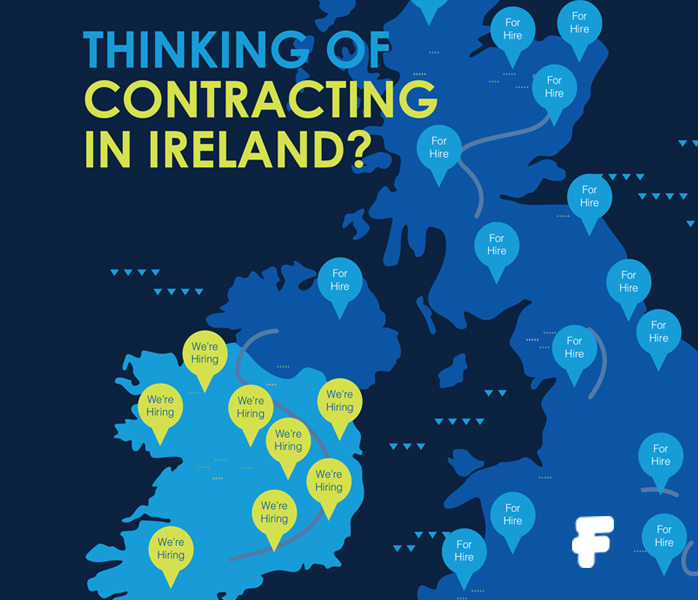Some of the most frequently asked questions we get from UK contractors who are interested in taking up a contract in Ireland and invoicing through their UK Limited Company are:
“What taxes do I pay if contracting in Ireland with a UK Limited Company?”
“When am I required to start paying Irish tax?”
Most people have an awareness of the 183 day rule, but this rule is also commonly misunderstood and leads contractors to incorrectly assume that if they are in Ireland for less than 183 days, they don’t have to think about the Irish tax system or pay Irish taxes.
Here’s our overview guide of how Irish taxes are applied for different contract lengths:
Less than 30 Days
If the contract is for less than 30 days, there is no requirement for the UK Limited Company or the contractor to pay Irish taxes. The long standing rule was that you also didn’t even need to inform Revenue of your presence in Ireland. In December 2016, they changed the wording of rule to rather unhelpfully state that you have to inform them if the work is “integral” or if you are replacing an employee – this put uncertainty over this rule as no definition or guidance provided for meaning of “integral”. However, if you feel that your work may fall under this criteria, you should register with Irish Revenue.
More than 30 Days but Less than 60 Days
The rules for contracts which are between 30 and 60 days, are almost identical to the rules for contracts of less than 30 days. There are some additional conditions to be met but the vast majority of contractors from EEA states would satisfy these conditions. In practice, this means most UK contractors are not required to notify the Irish tax authorities if they are operating here for less than 60 days.
More than 60 Days but Less than 183 Days
If your contract is for less than 183 days, you can apply for an exemption to Irish payroll taxes. There are a few conditions to be eligible for the exemption, but these are the ones to be most aware of:
- You must notify Irish Revenue within 21 working days of taking up duties in Ireland.
- You will need to provide evidence that the contractor pays payroll taxes in the UK e.g. supplying a copy of a payslip.
- You will also have to sign a declaration confirming that if a payroll liability arises at a later stage that you will pay the taxes which are owed. This simply means that if Revenue later find out that you weren’t actually eligible for the exemption, you can be liable for the taxes which should have been paid.
The majority of contractors whom we work with who are working in Ireland for less than 183 days, satisfy all the criteria and successfully gain exemption from Irish payroll tax.
If you have been granted exemption from Irish payroll tax, be aware that you must still file monthly payroll returns. However, these will simply be to declare a NIL tax liability. Unfortunately even though you are exempt from paying taxes, the Irish tax system does not also exempt you from submitting monthly payroll tax returns. So there is a small amount of ongoing admin to take care of.
More than 183 Days:
If you contracting in Ireland for more than 183 days, your company must operate Irish payroll tax on your salary. You will need to:
- Obtain an Irish PPS number (the Irish equivalent of a National Insurance number)
- Register your company for Irish payroll taxes
- Process monthly/weekly payroll on your earnings and pay payroll taxes to the Irish Revenue. It may be helpful to be aware that you are only required to pay Irish payroll tax on salary which relates to the work which you physically carry out whilst on on Irish soil. For example if you are working in Ireland 3 days a week and 2 days in the UK, only 3/5ths of your salary is subject to Irish payroll taxes.
- Submit monthly and year end payroll tax returns
- Deregister the company for Irish payroll taxes at the end of the contract
I don’t want to pay Irish taxes!
If your contract is for less than 183 days, you can apply for the payroll taxes exemption.
If the contract is for more than 183 days, or if you don’t apply for the exemption, then you must operate Irish payroll tax. However, Irish payroll tax is only chargeable on income which you take out as salary – it is not payable on the full value which is invoiced to your clients. Contractors can decide upon a reasonable salary level which is sufficient to cover your living costs in Ireland. The remainder of the income can be treated as profits in the UK company, allowing the contractor to take the remaining profit out as dividends in the UK. In this way, any Irish payroll taxes can often be quite nominal.
However, you must declare some Irish salary! You cannot work in Ireland for more than 183 days and not declare a reasonable level of salary which reflects your spending and outgoings whilst in Ireland. Also any Irish income tax paid should be available to be offset against UK income tax liabilities. This is due to the Double Taxation Agreement between Ireland and the UK.
Retaining the benefit of the UK dividend tax regime and offsetting Irish income taxes against UK income taxes assumes that you retain your UK tax residency status throughout. If you think you will be in Ireland long enough to lose your UK tax residency, there’s a number of issues you need to be aware of. Essentially, the loss of your UK tax residency status will have a serious impact in terms of where your dividends will be taxed and therefore you can lose the benefit of the structure you have set up.
What about corporation tax?
Can your company be liable to pay Irish corporation tax? In some cases, yes. Your company becomes liable to Irish corporation tax if it creates something known as a “Permanent Establishment”, known for short as a “PE”.
A “PE” is an action or activity, the result of which means the company is deemed to have a taxable presence in Ireland. There are a range of different things which could lead a company to create a PE. For contractors, the most common one is:
- The habitual concluding of contracts in Ireland (i.e. if you are consistently/regularly renewing your contracts whilst present in Ireland)
Typically for first contracts, a PE is not created and it’s quite easy to avoid. This becomes more difficult on each additional contract or contract renewal.
If you do create a PE, the company must register for Irish corporation tax and pay corporation tax on it’s Irish profits. Irish corporation tax payable is available to be offset against your UK corporation tax liability. Because of this and the fact that Irish corporation tax rates are lower than UK corporation tax rates, Irish corporation tax is not ultimately a cost.
Umbrella Company & Irish Limited Company Alternatives
There are of course alternatives to using your UK Limited Company. One is to use an Irish umbrella company solution. In Ireland you can avail of a Director Umbrella or PAYE Umbrella solution. You can also set up an Irish limited company – this can be a good option for UK contractors who have not previously operated with their own UK limited company.







